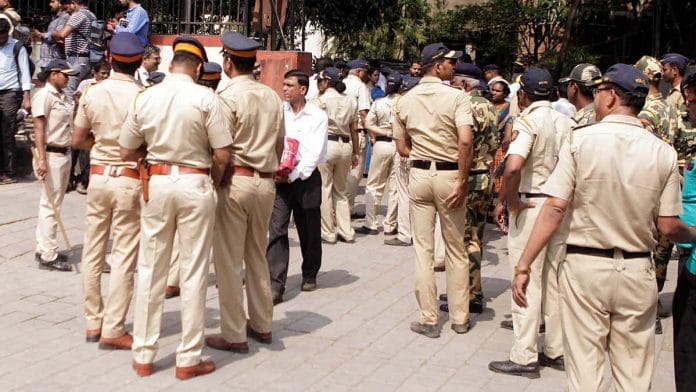New Delhi: Police officers have taken strong exception to the home ministry’s stand that the IPS Association was an illegal body since its formation did not have the “express sanction” of the central government.
IPS officers said the ministry’s stand reflects the bias of the IAS officers who man it.
On Wednesday, ThePrint had reported that the home ministry had told the Central Information Commission (CIC) — in connection with an RTI filed in 2018 — the police force does not have the right to form any association without the permission of the central government.
Section 3 of the Police Forces (Restrictions of Rights) Act, 1966, which has been cited by the home ministry to argue that the IPS Association does not have legal standing, says, “No member of a police force shall, without the express sanction of the Central Government or of the prescribed authority, be a member of, or be associated in any way with, any trade union, labour union, political association or with any class of trade unions, labour unions or political associations…”
A senior IPS officer told ThePrint that the IPS Association had existed for decades without creating any controversy. “How is it that suddenly the MHA has discovered this rule? It obviously reflects the bias IAS officers who man the ministry have against us, or they just don’t know better,” the officer added.
The 2018 RTI, which was filed by one Nutan Thakur, had sought details of whether the home ministry had any information or documents regarding the existence of the IPS Association and whether it is recognised by the government.
“The MHA has merely said that they don’t have any record on the IPS Association, and that is because they don’t need to,” said a second IPS officer.
Countering govt stand legally
P.V.R. Sastri, a former secretary of the IPS Association, also countered the home ministry stand on legal grounds.
“The rule the MHA has cited to state that we cannot form an association does not apply to the All India Services,” said Sastri, the Additional Director General (Law and Order) in Uttar Pradesh.
“The IPS is recruited and governed under the All India Service rules, and they don’t prohibit formation of an association of the IPS,” Sastri added.
“The IPS Association derives its legitimacy from the fundamental right to freedom of association… Restrictions can be imposed by statute, but the restrictions stated by the MHA do not apply to us.”
The second IPS officer also pointed out that the home ministry had consulted the IPS Association on several issues over the last few decades.
“If it is an illegal body, why was the government consulting it? The IPS Association has been party to several cases in the Supreme Court also…Why did the government or court not point out that the association was illegal?”
While the IPS officers have challenged the home ministry’s stand in front of the CIC, their counterparts in the Central Armed Police Forces see the government stand as a vindication of their position on the IPS Association.
“We have always maintained that this body has no locus standi, and now even the government has on record said that they don’t recognise it,” said a senior CRPF officer.
Also read: Every new IAS, IPS, IRS officer will now have to ‘adopt’ and mentor a teen for life







CIPSA
Recognition of all Central Civil Service Associations by govt under provisions of Rules 1993; Art 33 of constitution (50th amendmt) & GoI decision below Rule 15 CCS (conduct Rules) are relevent.
Police forces Restrictions of Rights Act 1966 appends Police Act 1861 at SL no. 2 of list of acts affected.
Section 3 (b) of the Police Forces Restriction of Rights Act, 1966 which flows from the constitution of India clearly prohibits any central government employee from forming an association or union without the express prior sanction of the central government unless the association so formed is purely for social, religious or recreational purposes. In other words service associations have to have sanction of the central government and charitable associations have to be registered with registrar of societies. If CIPSA is registered as a charitable association then it can not work for the furtherance of service interests of those in service. The objectives of CIPSA clearly stipulate that it is to work for the welfare of retired officers, rehabilitation and housing etc. The CIPSA has definitely gone beyond the scope of their registered bylaws in contesting in courts to safeguard the interests of their serving colleagues. Saying that the Police Forces Restriction of Rights Act, 1966 does not apply to them is totally baseless and misleading. Schedule annexed to the same act is a list of Police establishments which come under the ambit of this act. Police act, 1861 is one of them which has been amended from time to time.
If police who are to uphold rule of law start forming association, will it be army, called to protect law from such unionism?
If the logic put forth is assumed to be valid will it not be extended to CAPF and then to Army as well?
Need to understand the spirit behind such legislation instead of arguing to uphold self interest.
The actual fact is post joining the services these officers are so busy in managing their postings and Political bosses. Exceptions are always there, Shri Ajit Doval , Shri K Vijay Kumar, who can undermine their contributions. But most of them forget the basic tenants of any Uniform Officer this is why now they have gone to say that IPS are not under the ambit of Police Officers (Restrictions of Rights) Act. It means they want to say that they are not Police Officers rather they are competitors of IAS. This is why the policing in most of the states are not prepared to meet the challenges. The few IPS officers who wants to work honestly are overwhelmed by inefficient but good managers.